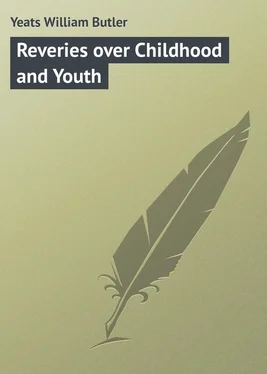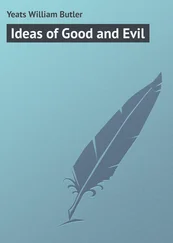William Yeats - Reveries over Childhood and Youth
Здесь есть возможность читать онлайн «William Yeats - Reveries over Childhood and Youth» — ознакомительный отрывок электронной книги совершенно бесплатно, а после прочтения отрывка купить полную версию. В некоторых случаях можно слушать аудио, скачать через торрент в формате fb2 и присутствует краткое содержание. Жанр: foreign_prose, на английском языке. Описание произведения, (предисловие) а так же отзывы посетителей доступны на портале библиотеки ЛибКат.
- Название:Reveries over Childhood and Youth
- Автор:
- Жанр:
- Год:неизвестен
- ISBN:нет данных
- Рейтинг книги:4 / 5. Голосов: 1
-
Избранное:Добавить в избранное
- Отзывы:
-
Ваша оценка:
- 80
- 1
- 2
- 3
- 4
- 5
Reveries over Childhood and Youth: краткое содержание, описание и аннотация
Предлагаем к чтению аннотацию, описание, краткое содержание или предисловие (зависит от того, что написал сам автор книги «Reveries over Childhood and Youth»). Если вы не нашли необходимую информацию о книге — напишите в комментариях, мы постараемся отыскать её.
Reveries over Childhood and Youth — читать онлайн ознакомительный отрывок
Ниже представлен текст книги, разбитый по страницам. Система сохранения места последней прочитанной страницы, позволяет с удобством читать онлайн бесплатно книгу «Reveries over Childhood and Youth», без необходимости каждый раз заново искать на чём Вы остановились. Поставьте закладку, и сможете в любой момент перейти на страницу, на которой закончили чтение.
Интервал:
Закладка:
My grown-up uncles and aunts, my grandfather’s many sons and daughters, came and went, and almost all they said or did has faded from my memory, except a few harsh words that convince me by a vividness out of proportion to their harshness that all were habitually kind and considerate. The youngest of my uncles was stout and humorous and had a tongue of leather over the keyhole of his door to keep the draught out, and another whose bedroom was at the end of a long stone passage had a model turret ship in a glass case. He was a clever man and had designed the Sligo quays, but was now going mad and inventing a vessel of war that could not be sunk, his pamphlet explained, because of a hull of solid wood. Only six months ago my sister awoke dreaming that she held a wingless sea-bird in her arms and presently she heard that he had died in his mad-house, for a sea-bird is the omen that announces the death or danger of a Pollexfen. An uncle, George Pollexfen, afterwards astrologer and mystic, and my dear friend, came but seldom from Ballina, once to a race meeting with two postillions dressed in green; and there was that younger uncle who had sent me for the railway-pass. He was my grandmother’s favourite, and had, the servants told me, been sent away from school for taking a crowbar to a bully.
I can only remember my grandmother punishing me once. I was playing in the kitchen and a servant in horseplay pulled my shirt out of my trousers in front just as my grandmother came in and I, accused of I knew not what childish indecency, was given my dinner in a room by myself. But I was always afraid of my uncles and aunts, and once the uncle who had taken the crowbar to the bully found me eating lunch which my grandmother had given me and reproved me for it and made me ashamed. We breakfasted at nine and dined at four and it was considered self-indulgent to eat anything between meals; and once an aunt told me that I had reined in my pony and struck it at the same moment that I might show it off as I rode through the town, and I, because I had been accused of what I thought a very dark crime, had a night of misery. Indeed I remember little of childhood but its pain. I have grown happier with every year of life as though gradually conquering something in myself, for certainly my miseries were not made by others but were a part of my own mind.
II
One day someone spoke to me of the voice of the conscience, and as I brooded over the phrase I came to think that my soul, because I did not hear an articulate voice, was lost. I had some wretched days until being alone with one of my aunts I heard a whisper in my ear, “what a tease you are!” At first I thought my aunt must have spoken, but when I found she had not, I concluded it was the voice of my conscience and was happy again. From that day the voice has come to me at moments of crisis, but now it is a voice in my head that is sudden and startling. It does not tell me what to do, but often reproves me. It will say perhaps, “that is unjust” of some thought; and once when I complained that a prayer had not been heard, it said, “you have been helped.” I had a little flagstaff in front of the house and a red flag with the Union Jack in the corner. Every night I pulled my flag down and folded it up and laid it on a shelf in my bedroom, and one morning before breakfast I found it, though I knew I had folded it up the night before, knotted round the bottom of the flagstaff so that it was touching the grass. I must have heard the servants talking of the faeries for I concluded at once that a faery had tied those four knots and from that on believed that one had whispered in my ear. I have been told, though I do not remember it myself, that I saw, whether once or many times I do not know, a supernatural bird in the corner of the room. Once too I was driving with my grandmother a little after dark close to the Channel that runs for some five miles from Sligo to the sea, and my grandmother showed me the red light of an outward-bound steamer and told me that my grandfather was on board, and that night in my sleep I screamed out and described the steamer’s wreck. The next morning my grandfather arrived on a blind horse found for him by grateful passengers. He had, as I remember the story, been asleep when the captain aroused him to say they were going on the rocks. He said, “have you tried sail on her?” and judging from some answer that the captain was demoralised took over the command and, when the ship could not be saved, got the crew and passengers into the boats. His own boat was upset and he saved himself and some others by swimming; some women had drifted ashore, buoyed up by their crinolines. “I was not so much afraid of the sea as of that terrible man with his oar,” was the comment of a schoolmaster who was among the survivors. Eight men were, however, drowned and my grandfather suffered from that memory at intervals all his life, and if asked to read family prayers never read anything but the shipwreck of St. Paul.
I remember the dogs more clearly than anyone except my grandfather and grandmother. The black hairy one had no tail because it had been sliced off, if I was told the truth, by a railway train. I think I followed at their heels more than they did at mine, and that their journeys ended at a rabbit-warren behind the garden; and sometimes they had savage fights, the black hairy dog, being well protected by its hair, suffering least. I can remember one so savage that the white dog would not take his teeth out of the black dog’s hair till the coachman hung them over the side of a water-butt, one outside and one in the water. My grandmother once told the coachman to cut the hair like a lion’s hair and, after a long consultation with the stable-boy, he cut it all over the head and shoulders and left it on the lower part of the body. The dog disappeared for a few days and I did not doubt that its heart was broken. There was a large garden behind the house full of apple-trees with flower-beds and grass-plots in the centre and two figure-heads of ships, one among the strawberry plants under a wall covered with fruit trees and one among the flowers. The one among the flowers was a white lady in flowing robes, while the other, a stalwart man in uniform, had been taken from a three-masted ship of my grandfather’s called “The Russia,” and there was a belief among the servants that the stalwart man represented the Tsar and had been presented by the Tsar himself. The avenue, or as they say in England the drive, that went from the hall door through a clump of big trees to an insignificant gate and a road bordered by broken and dirty cottages, was but two or three hundred yards, and I often thought it should have been made to wind more, for I judged people’s social importance mainly by the length of their avenues. This idea may have come from the stable-boy, for he was my principal friend. He had a book of Orange rhymes, and the days when we read them together in the hay-loft gave me the pleasure of rhyme for the first time. Later on I can remember being told, when there was a rumour of a Fenian rising, that rifles had been served out to the Orangemen and presently, when I had begun to dream of my future life, I thought I would like to die fighting the Fenians. I was to build a very fast and beautiful ship and to have under my command a company of young men who were always to be in training like athletes and so become as brave and handsome as the young men in the story-books, and there was to be a big battle on the sea-shore near Rosses and I was to be killed. I collected little pieces of wood and piled them up in a corner of the yard, and there was an old rotten log in a distant field I often went to look at because I thought it would go a long way in the making of the ship. All my dreams were of ships; and one day a sea captain who had come to dine with my grandfather put a hand on each side of my head and lifted me up to show me Africa, and another day a sea captain pointed to the smoke from the Pern mill on the quays rising up beyond the trees of the lawn, as though it came from the mountain, and asked me if Ben Bulben was a burning mountain.
Читать дальшеИнтервал:
Закладка:
Похожие книги на «Reveries over Childhood and Youth»
Представляем Вашему вниманию похожие книги на «Reveries over Childhood and Youth» списком для выбора. Мы отобрали схожую по названию и смыслу литературу в надежде предоставить читателям больше вариантов отыскать новые, интересные, ещё непрочитанные произведения.
Обсуждение, отзывы о книге «Reveries over Childhood and Youth» и просто собственные мнения читателей. Оставьте ваши комментарии, напишите, что Вы думаете о произведении, его смысле или главных героях. Укажите что конкретно понравилось, а что нет, и почему Вы так считаете.












